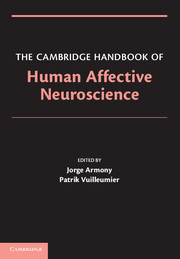Book contents
- The Cambridge Handbook of Human Affective Neuroscience
- The Cambridge Handbook of Human Affective Neuroscience
- Copyright page
- Dedication
- Contents
- List of Contributors
- Introduction
- Section I Introduction to Human Affective Neuroscience
- Section II Measuring Emotional Responses
- Section III Emotion Perception and Elicitation
- Section IV Cognitive-Emotion Interactions
- Section V Emotional Learning and Memory
- Section VI Social Emotions
- Section VII Individual Differences in Emotion
- Index
Section I - Introduction to Human Affective Neuroscience
Published online by Cambridge University Press: 05 February 2013
- The Cambridge Handbook of Human Affective Neuroscience
- The Cambridge Handbook of Human Affective Neuroscience
- Copyright page
- Dedication
- Contents
- List of Contributors
- Introduction
- Section I Introduction to Human Affective Neuroscience
- Section II Measuring Emotional Responses
- Section III Emotion Perception and Elicitation
- Section IV Cognitive-Emotion Interactions
- Section V Emotional Learning and Memory
- Section VI Social Emotions
- Section VII Individual Differences in Emotion
- Index
Summary
- Type
- Chapter
- Information
- Publisher: Cambridge University PressPrint publication year: 2013
- 45
- Cited by

